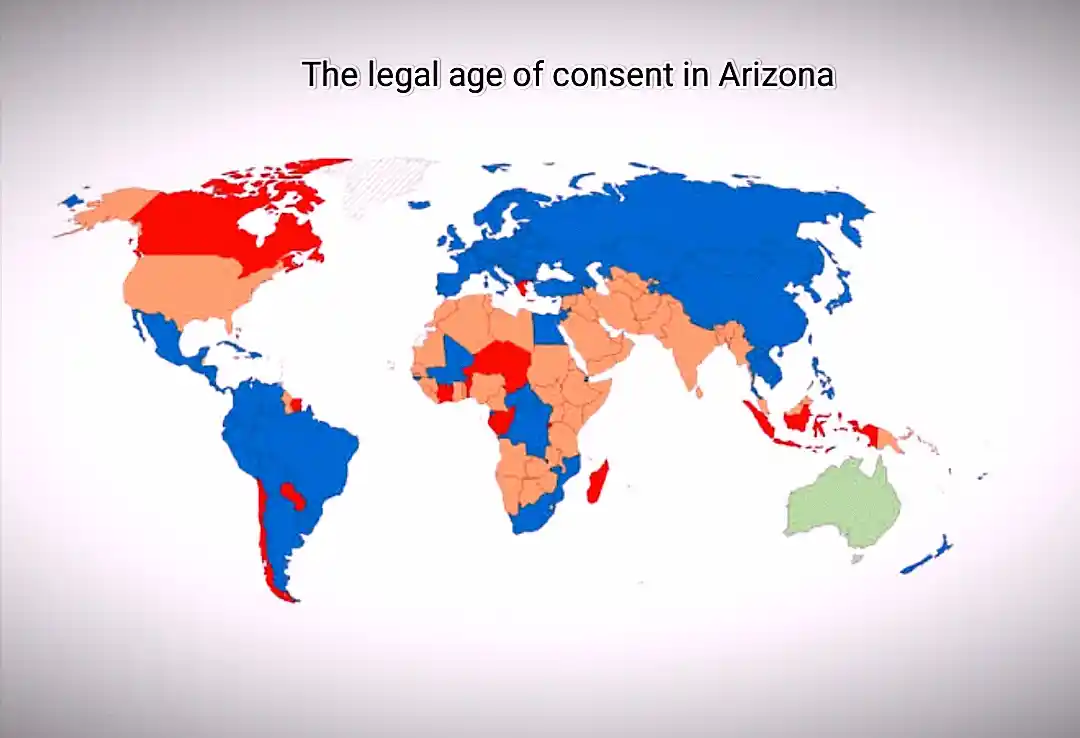The Legal Age of Consent in Arizona: A Comprehensive Guide

Understanding the laws regarding the age of consent is crucial for both young and adults. In Arizona, like in many other United state states, these laws are designed to protect young individuals from exploitation while providing clarity on what constitutes consensual se-xual activity. This blog post will give a detailed and comprehensive overview of the legal age of consent in Arizona, explaining the implications of the law, exceptions, potential legal consequences, and other factors. We’ll also answer frequently asked questions to help clarify common concerns about this sensitive topic.
What is the Legal Age of Consent in Arizona?
Table of Contents
In Arizona, the legal age of consent is 18 years old. This means individuals under 18 cannot legally consent to se-xual activity. Engaging in se-xual conduct with someone below this age can lead to serious criminal charges, even if the minor willingly participated.
Arizona law provides a “close-in-age” exemption, commonly known as the “Romeo and Juliet” law. This exemption applies when:
- The minor is 15, 16, or 17 years old.
- The defendant is under 19 years old or attending high school.
- The age difference between the parties is 24 months at maximum.
- The se-xual conduct was consensual.
This exemption serves as an affirmative defense, meaning the defendant must prove these conditions were met to avoid prosecution.
Violating Arizona’s age of consent laws can result in severe penalties, including felony charges, imprisonment, and mandatory s-ex offender registration. The severity of the punishment often depends on the ages of the individuals involved and the nature of the offense.
It’s important to note that while some states have lower ages of consent or different close-in-age exemptions, Arizona maintains a strict age of consent at 18, with limited exceptions.
Understanding Statutory Rape Laws in Arizona
The Arizona statutory rape laws are designed to prevent se-xual exploitation of minors. When someone engages in se-xual conduct with a person under 18, this is considered statutory rape, regardless of whether the minor gave verbal consent. The rationale behind statutory rape laws is to recognize that minors may not have the emotional or intellectual maturity required to make such important decisions, and adults must respect those boundaries.
Close-in-Age Exemptions (Romeo and Juliet Laws)
Arizona does have some close-in-age exemptions, often known as Romeo and Juliet laws. These laws are intended to protect young couples from facing severe legal penalties due to consensual relationships where both participants are close in age. Specifically, Arizona law provides some leniency if:
- The age difference between the parties is less than two years.
- Both individuals are between the ages of 15 and 19.
This exemption ensures that consensual relationships between teenagers do not result in criminal prosecution. However, if a significant age difference exists between the two individuals, such as a 19-year-old and a 15-year-old, the older person could face statutory rape charges even if the relationship is consensual.
Exceptions and Defenses
In some instances, a person charged with statutory rape can use certain defenses, though these defenses are limited. One such defense is a mistake of age—if the individual reasonably believed that the other person was over 18. However, this defense requires proof that the accused genuinely had reason to believe that the other person was of legal age.
Other exceptions relate to lawful marriage. In Arizona, individuals under 18 can get married with parental consent and/or court approval, depending on the circumstances. In such cases, the se-xual activity between a legally married couple is not considered a violation of the age of consent laws.
Legal Consequences of Violating the Age of Consent Law
The legal consequences of violating Arizona’s age of consent laws are severe. Depending on the circumstances, the penalties could include:
- Class 2 Felony: If an adult (someone over 18) engages in se-xual intercourse or oral sexual contact with a minor under 15, they may be charged with a Class 2 felony. This crime can carry a lengthy prison sentence of up to 27 years.
- Class 6 Felony: Engaging in se-xual conduct with someone who is 15, 16, or 17 years old can be considered a Class 6 felony, which carries lighter penalties but can still result in prison time and registration as a se-x offender.
- Se-x Offender Registration: Anyone convicted of a se-x crime involving a minor will likely be required to register as a se-x offender, potentially for life. This has significant social and professional consequences, including difficulties finding employment, restrictions on residency, and societal stigma.
Implications of Being a Registered Se-x Offender
If convicted of a crime related to violating age of consent laws, an individual may be required to register as a se-x offender. This has far-reaching implications that go beyond the criminal penalties. Registered se-x offenders face limitations on where they can live, often cannot live near schools or parks, and must regularly report their address to law enforcement.
In Arizona, se-x offender registration is public information, which means that anyone can look up registered se-x offenders in their area. This can lead to significant social consequences, including isolation, employment difficulties, and housing restrictions.
Why is the Legal Age of Consent Set at 18?
Arizona’s age of consent is set at 18 to ensure that young people are mature enough to make informed decisions regarding their se-xual health and relationships. The law is designed to protect those who may not yet have the emotional or psychological capability to handle the complexities of se-xual relationships.
Research has shown that individuals under 18 are at a higher risk of exploitation, coercion, or manipulation. Setting the age of consent at 18 helps prevent situations where older individuals take advantage of younger, more vulnerable persons.
Parental Influence and Consent
In Arizona, parents play an essential role in the lives of minors, including decisions regarding relationships. While parental consent is required for some activities, like marriage before 18, parental consent cannot override the age of consent law for se-xual activity. Even if a parent approves of their child’s relationship with someone over 18, that individual could still be prosecuted if se-xual activity occurs.
How Arizona Laws Compare to Other States
Arizona’s age of consent laws are similar to those in many other states, though there are some notable differences. The age of consent in the United States varies between 16 to 18 years, depending on the state. States like Hawaii, Alabama, and Colorado set the age of consent at 16, while Arizona, along with California and Florida, has set it at 18.
Some states also have broader Romeo and Juliet laws that permit more significant age gaps between consenting partners. Arizona’s rules are more restrictive in comparison, meaning that individuals engaging in relationships must be especially mindful of the local legal landscape.
Potential Reforms and Debates
Arizona’s age of consent laws are often a topic of debate. Some argue that the current age of 18 is appropriate for protecting young people, while others suggest that it should be lowered to align with other states. Proponents of lowering the age of consent often cite the fact that many teenagers are in relationships with slightly older partners and may face legal consequences for consensual behavior that should not be criminalized.
On the other hand, advocates for maintaining or even raising the age of consent argue that doing so provides additional protections for minors. They emphasize the psychological and emotional consequences that can arise from se-xual relationships at a young age and the need for adults to bear the responsibility of protecting minors.
Romeo and Juliet law Arizona
Arizona’s “Romeo and Juliet” law provides a legal defense for certain individuals accused of engaging in consensual se-xual conduct with minors aged 15 to 17. This close-in-age exemption aims to prevent the prosecution of young individuals who engage in consensual se-xual activities when they are close in age. According to Arizona Revised Statutes §13-1407(E), the defense applies if:
- The minor is 15, 16, or 17 years old.
- The defendant is under 19 years old or is attending high school.
- The age difference between the defendant and the minor is less than 24 months.
- The sexual conduct was consensual.
It’s important to note that this law serves as an affirmative defense, meaning the defendant bears the burden of proving that all these conditions were met at the time of the alleged offense.
This exemption is designed to protect young individuals from severe legal consequences arising from consensual relationships with peers close in age. However, it does not apply if the minor is under 15 or the age difference exceeds two years.
For more detailed information, refer to the Arizona Revised Statutes §13-1407.
Age of consent by state
In the United States, the age of consent, the minimum age at which an individual is legally considered capable of consenting to se-xual activity, varies by state, typically ranging from 16 to 18 years old. Engaging in sexual activities with someone below the state’s age of consent can lead to charges of statutory rape or similar offenses.
Here’s a breakdown of the age of consent across the United States.:
- 16 years old: Alabama, Alaska, Arkansas, Connecticut, District of Columbia, Georgia, Hawaii, Indiana, Iowa, Kansas, Kentucky, Maine, Maryland, Massachusetts, Michigan, Minnesota, Mississippi, Montana, Nebraska, Nevada, New Hampshire, New Jersey, North Carolina, Ohio, Oklahoma, Pennsylvania, Rhode Island, South Carolina, South Dakota, Vermont, Washington, West Virginia.
- 17 years old: Colorado, Illinois, Louisiana, Missouri, New Mexico, New York, Texas, Wyoming.
- 18 years old: Arizona, California, Delaware, Florida, Idaho, North Dakota, Oregon, Tennessee, Utah, Virginia, and Wisconsin.
Some states have “close-in-age” exemptions, often referred to as “Romeo and Juliet” laws, which decriminalize consensual se-xual activities between minors who are close in age. For instance, in Connecticut, a person aged 13 can consent to se-xual activity with someone who is not more than three years older.
It’s important to note that these laws can be complex and may include additional stipulations, such as higher ages of consent when one party holds a position of authority over the other. For detailed information on each state’s laws, you can refer to resources like AgeOfConsent.net.
Given the legal complexities and potential consequences, it is advisable to consult legal professionals or official state resources for guidance on specific situations.
FAQ: Common Questions About the Age of Consent in Arizona
Can a 17-year-old legally have a relationship with a 19-year-old in Arizona?
Yes, a 17-year-old can legally have a relationship with a 19-year-old. However, engaging in se-xual activity may lead to criminal charges for the older individual. Arizona law does not allow minors (under 18) to consent to se-xual activity.
What if both individuals are under 18?
The law is more lenient if both individuals are under 18 and close in age. The Romeo and Juliet law may apply to protect both parties from severe penalties, especially if they are less than two years apart.
Can parents permit their minor child to engage in a relationship with an adult?
No, parental consent cannot override Arizona’s age of consent law. Se-xual activity with someone under 18 is illegal, regardless of parental approval.
What is the legal age of consent in Arizona?
In Arizona, the legal age of consent is 18 years old. This means that individuals who are under the age of 18 cannot legally consent to se-xual activity. The state has implemented these age restrictions to protect minors from being pressured or coerced into se-xual relationships before they are ready or lawfully able to make such decisions.
The age of consent is significant because engaging in se-xual activities with someone under this age can lead to severe legal consequences, including criminal charges and being labeled as a se-x offender. Understanding these laws is critical for avoiding actions that could lead to severe penalties.
Conclusion
The age of consent laws in Arizona are designed to protect young people from being coerced or exploited in se-xual relationships before they are ready. The legal age of consent is set at 18, with strict penalties for those violating these laws. While there are some exceptions for close-in-age relationships, it is essential to understand the risks and legal consequences involved.
If you have concerns about the age of consent or are unsure whether certain activities could be illegal, it is always advisable to consult a legal professional. Ignorance of the law is not a defense, and understanding the nuances of Arizona’s laws can help you make informed decisions and avoid potentially life-altering legal issues.
Key Takeaways
- The legal age of consent in Arizona is 18 years old.
- Arizona has Romeo and Juliet exemptions for individuals close in age.
- Violating age of consent laws can result in serious legal consequences, including felony charges and se-x offender registration.
- Parental consent does not allow minors to consent to se-xual activity legally.
Always stay informed and know your local laws to protect yourself and others from unintended legal consequences.
Related posts,
>> Top Truck Accident Lawyers: Navigating the Legal Road Ahead
>> Free Legal Advice Car Accident Victims: Your Essential Guide to Navigating the Legal Maze


